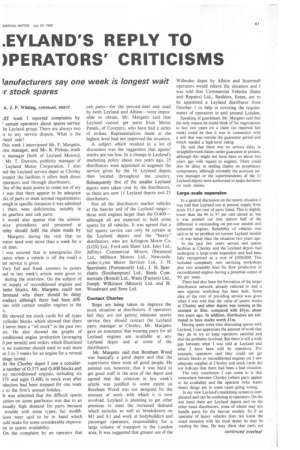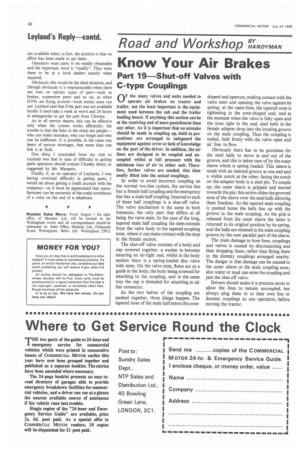.EYLAND'S REPLY TO WERATORS' CRITICISMS
Page 43

Page 44

If you've noticed an error in this article please click here to report it so we can fix it.
lanufacturers say one week is longest wait ir stock spares
A. J. P. Wilding, AMIMeehE, M1RTE
ST week I reported complaints by ' certain operators about spares service he Leyland group. There are always two ;s to any service dispute. What is the 'land side?
l'his week I interviewed Mr. F. Margetts, /ice manager, and Mr. B. Pickup, truck :s manager (both of Leyland Motors), Mr. T. Dawson, publicity manager of Leyland Motor Corporation. I also ted the Leyland service depot at Chorley inspect the facilities it offers both direct Operators and through distributors.
3ne of the main points to come out of my t was that there appear to be adequate r...ks of parts to meet normal requirements; lough in specific instances it was admitted t there were deficiencies, notably in re gearbox and cab parts.
It would also appear that the adminidive procedures and personnel at orley should fulfil the claim made by . Margetts during the visit that no :rator need wait more than a week for a ck item.
I was assured that in emergencies (for tance when a vehicle is off the road) a ter service is given.
Very full and frank answers to points ied in last week's article were given to during the interview. On the subject of irt supply of reconditioned engines and inder blocks, Mr. Margetts could not lerstand why there should be delay wadays although there had been diffities with certain smaller engines in the He showed me stock cards for all types cylinder blocks which showed that there never been a "nil stock" in the past two us. He also showed me graphs of onditioned engine production (averaging 0 per month) and orders which illustrated a no customer should need to wait more in 2 to 3 weeks for an engine for a normal ulage model.
At the Chorley depot I saw a consider.e number of 0.375 and 0.400 blocks and .ny reconditioned engines, including six 375 and eight 0.400, in stock even after gluction had been stopped for one week to the firm's annual holiday.
It was admitted that the difficult spares lation on some gearboxes was due to an usually high demand for parts because trouble with some types; but modifiions were said to be in hand which 3uld make for some considerable improve:1U in spares availability.
On the complaint by an operator that cab parts—for the pressed-steel unit used by both Leyland and Albion—were impossible to obtain, Mr. Margetts said that Leyland cannot get parts from Motor Panels, of Coventry, who have had a series of strikes. Representations made at the highest level had not improved the situation.
A subject which resulted in a lot of discussion was the suggestion that agents' stocks are too low. In a change in Leyland's marketing policy about two years ago, 25 distributors were appointed to augment the service given by the 16 Leyland depots then located throughout the country. Subsequently five of the smaller Leyland depots were taken over by the distributors, so there are now 11 Leyland depots and 25 distributors.
Not all the distributors market vehicles at the heavier end of the Leyland range— those with engines larger than the 0.400— although all are expected to hold some spares for all vehicles. It was agreed that a full spares service can only be certain at the Leyland depots and the "heavy" distributors, who are Arlington Motor Co. (LGS) Ltd., Ford and Slater Ltd., Isles Ltd., Jeffreys Commercial Motors (Swansea) Ltd., Millburn Motors Ltd., Newcastleunder-Lyme Motor Services Ltd., J. H. Sparshatts (Portsmouth) Ltd., J. H. Sparshatts (Southampton) Ltd., Steels Commercials (Bristol) Ltd., Watts (Factors) Ltd., Joseph Wilkinson (Motors) Ltd. and H. Woodward and Sons Ltd.
Contact Chorley
Steps are being taken to improve the stock situation at distributors. If operators feel they are not getting adequate spares service they should contact the Leyland parts manager at Chorley. Mr. Margetts gave an assurance that wearing parts for all Leyland engines are available at any Leyland depot and at some of the distributors.
Mr. Margetts said that Boreham Wood was basically a good depot and that the supervisors there were all good people. He pointed out, however, that it was hard to get good staff in the area of the depot and agreed that the criticism in last week's article was justified to some extent as Boreham Wood was not designed for the amount of work with which it is now involved. Leyland is planning to get other premises to meet the increased demand which includes as well as breakdowns on M1 and Al and work at bodybuilders and passenger operators, responsibility for a large volume of transport in the London area. It was suggested that greater use of the Willesden depot by Albion and Scammell operators would relieve the situation and I was told that Commercial Vehicles (Sales and Repairs) Ltd., Basildon, Essex, are to _ be appointed a Leyland distributor from October 1 to help in covering the requirements of operators in and around London.
Speaking of guarantees, Mr. Margetts said that the only reason he could think of for negotiations to last two years on a claim (as reported last week) could be that it was in connection with a unit that was outside the guarantee period and which needed a high-level ruling.
He said that there was no serious delay in straightforward claims under guarantee at present, although this might not have been so about two years ago with regard to engines. There could also be delay in settling claims on proprietary components, although normally the assistant ser• vice manager or the superintendents of the 11 Leyland depots were authorized to make decisions on such claims.
Large-scale expansion In a general discussion on the spares situation I was told that Leyland can at present supply from stock 93.3 per cent of parts listed. This is slightly lower than the 96 to 97 per cent aimed at: but it was pointed out that almost half of the difference is outstanding on pre-war models and industrial engines. Reliability of vehicles was said to be no problem on current Leyland models —it was better than the situation two years ago.
In the past few years service and spares facilities at Chorley and the Leyland depots had undergone a large-scale expansion and had been fully reorganized at a cost of f500.000. This included completely new servicing workshops plus two assembly lines for flow production of reconditioned engines having a potential output of 90 per week.
There had also been the formation of the larger distribution network already referred to and a new injector workshop has been built. Some idea of the cost of providing service was given when I was told that the value of spares stocks at Chorley and other depots was running at the moment at £6m. compared with £4-1-m. about two years ago. In addition, distributors are estimated to have stocks worth Llm.
Having spent some time discussing spares with Leyland. I can appreciate the amount of work that they do to try to keep operators satisfied and also the problems involved. But there is still a wide gap between what I was told at Leyland and what I have been told by operators. For example, operators said they could not get certain blocks or reconditioned engines yet I saw adequate supplies at Chorley and stock cards did not indicate that there had been a bad situation.
The only conclusion I can come to is that somewhere between Chorley (where parts appear to be available) and the operator (who wants them) things are in some cases going wrong.
In my view Leyland's marketing system is complicated and can be confusing to operators. On the one hand there are Leyland depots and on the other hand distributors, some of whom may not handle parts for the heavier models. So if an operator of heavy vehicles does not know the exact situation with his local dealer he may be wasting his time. He may think that parts arc not available when, in fact, the position is that no effort has been made to get them.
Operators want parts to be readily obtainable and the important word is "readily". They want them to be at a local dealers exactly when required.
Obviously this would be the ideal situation, and (though obviously it is impracticable) when there are runs on certain types of part—such as brakes, suspension parts and so on, as when GV9s are flying around—local stocks soon run out. Leyland said that if the part was not available locally it need take a week at worst and 24 hours in emergencies to get the part from Chorley.
As in all service depots, this can be effective only when the system works efficiently; the trouble is that the links in the chain are people— who can make mistakes, who can forget and who can be inefficient. It is possible, in the cases one hears of serious shortages, that more than one link is at fault.
One thing I concluded from my visit to Leyland was that in case of difficulty in getting parts operators should contact Chopley direct, as suggested by Mr. Margetts.
Finally, if, as an operator of Leylands, I was having continual difficulty in getting parts, I would set about getting a credit account with the company—as it must be appreciated that manufacturers can be uncertain of the credit worthiness of a voice on the end of a telephone.
































































































































































